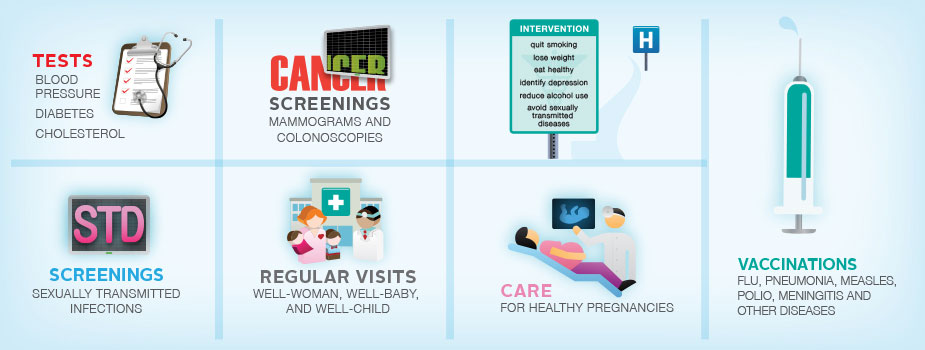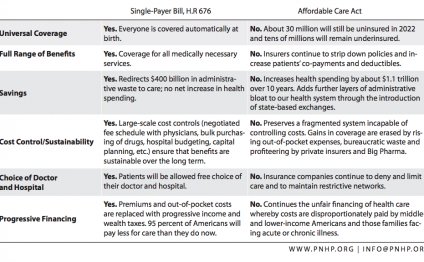For instance, in California, 53% of likely citizens back single-payer but support drops to just 41% when they are informed it will require new taxes. Rather, let's broaden on a strategy from the ACA: cap out-of-pocket expenses based upon earnings no matter where the individual gets insurance coverage. This cap can be used in Medicare, Medicaid, and private insurance coverage so that no middle-class individual would pay more than 10% of their earnings on health care expenses.
Those coalitions need to be consisted of individuals who use and pay for their healthcare. An enormous union of customers, unions, employers, small services, guvs, and willing individuals of the health care industry are needed to conquer opposition to change. The kernels of such a coalition are offered through Consumers Initially, which is concentrated on straightening healthcare rewards to reduce expenses and improve quality.
An expert on the Vermont single-payer plan stated, "If you can't do it in Vermont, with one private health strategy and low uninsured rates, then the amount of disruption you would have nationally with winners and losers would be massive. what is health care policy."38 Some individuals in this country receive totally free or incredibly marked down care through Medicaid and the ACA exchanges.
Rather of making them even worse off, Congress needs to concentrate on the countless people who are qualified free of charge and discounted care and make sure they are enrolled through auto-enrollment or one-click streamlined enrollment process. And all low- and middle-income households must get defense from high expenses based on their earnings.
With 29 million uninsured and tens of millions more anxious about healthcare expenses, the nation does not have time to squander on policies that won't go anywhere. Instead, let's strengthen the ACA, control costs, construct strong unions, and attain universal protection. In 2017, Wood spoke at a Bernie Sanders interview on universal healthcare. This Additional reading previous June, she affirmed at a congressional hearing on universal health coverage. She now works full-time for Mass-Care, a Massachusetts-based nonprofit advocating for Medicare for All. Not every single-payer advocate's story is as heartbreaking as Wood's.

In 2016, it was the special quirk of Sanders's candidacy; now 11 prospects support some version of it. Single-payer healthcare, the kind that exists in Canada and some European nations, would make healthcare free or almost complimentary for all Americans. Under some versions of these strategies, private insurance coverage would be gotten rid of, and all Americans would be covered under one, government-run plan, similar to Medicare.
Excitement About What Countries Have Single Payer Health Care
Many either have or recently had medical insurance, however they state it wasn't enough to safeguard them or their household members from death, disease, or financial obligation. Medicare for All strikes many as the easiest way to stop the health-care madness, even if the political course to it isn't yet clear.
In such a way, the rallying cry of single-payer harkens back to President Barack Obama's usage of, in the dark days of the 2008 economic crisis, boosting mottos like "Hope," "Change," and "Yes, we can." Many people didn't understand precisely how "hope" would lead us out of economic gloom. However just as with healthcare today, they were quite sure it couldn't get any even worse.
Many moderate Democrats and many conservatives remain staunchly opposed to any sort of single-payer strategy. Previous Vice President Joe Biden, who supports more incremental health reforms, has actually said Medicare for All would raise taxes on the middle class. Many Democrats are uneasy about dismantling the personal health-insurance market, and they fret about how such a sweeping program would be moneyed.
Marie Fishpaw, the director of domestic-policy studies at the Heritage Structure, a conservative think tank, disagreements that Medicare for All is even all that popular. (Assistance for Medicare for All has actually decreased rather since 2017.) "While surveys reveal preliminary assistance for Medicare for All, there is an exceptional drop in assistance when people find out more about the information," she told me by means of email.
A majority of Americans continue to say the federal government has a responsibility to make sure all Americans have healthcare protection (what does cms stand for in health care). And given that last year, there has been a boost especially amongst Democrats in the share saying medical insurance should be offered by a single national program run by the government.
For this analysis, we conducted an online survey of 11,001 U.S. grownups in between July 27 and Aug. 2, 2020. Everyone who took part is a member of the Center's American Trends Panel (ATP), an online survey panel that is recruited through nationwide, random tasting of property addresses. By doing this nearly all U.S.
What Is A Health Care Tax Credit Things To Know Before You Buy
The study is weighted to be representative of the U.S. adult population by gender, race, ethnic culture, partisan association, education and other classifications. Find out more about the ATP's approach. Here are the concerns used for this report, along with reactions, and its approach. Amongst the public overall, 63% of U.S. grownups say the federal government has the responsibility to supply healthcare coverage for all, up somewhat from 59% last year.
2 amongst 11,001 adults. When asked how the government ought to offer medical insurance protection, 36% of Americans say it needs to be provided through a single nationwide government program, while 26% say it must continue to be Mental Health Facility provided through a mix of personal insurance provider and federal government programs. This is a modification from about a year back, when nearly equivalent shares supported a "single payer" health insurance program (30%) and a mix of federal government programs and personal insurance providers (28%).
A 54% majority of Democrats and Democratic leaners now prefer a single national government program to offer medical insurance, up from 44% in 2015. Assistance for single payer health coverage has increased amongst most groups of Democrats, consisting of those who describe their political views as really liberal (up from 66% to 77%), liberal (50% to 61%) and conservative or moderate (35% to 43%).
Amongst the one-third of Republicans who state the federal government does have this responsibility, opinion is divided over whether or not it must be supplied through a single government program or a mix of private and government programs. Although many Republicans state it is not the government's responsibility to ensure health protection for all, a 54% majority states the government "ought to continue to supply programs like Medicare and Medicaid for senior citizens and the extremely bad." Only 11% of Republicans say the federal government must not be included at all in offering medical insurance.
Very liberal Democrats, who in 2019 constituted 15% of Democratic signed up citizens, are even more likely than liberal Democrats (32% of Democrats) and moderates and conservatives (51%) to say that health insurance should be supplied by a single government program. White Democrats stay most likely than those of other races and ethnicities to support a single nationwide program, however White, Black and Hispanic Democrats have each increased their support for a single nationwide program by about 10 portion points since in 2015.
With a system that is highly reliant on employer-based, for-profit medical insurance, countless Americans have no or insufficient protection. The patchwork of costly, unequal insurance plans has added to personal bankruptcy, homelessness, avoidable illness, and death. Inflated insurance coverage and health care costs put unfair demands on businesses and taxpayers. By making top quality healthcare for all as cost-efficient as possible, a single-payer system satisfies the health requirements of the public and contributes to a healthy economy.
3 Easy Facts About What Is The Primary Mechanism That Enables People To Obtain Health Care Services? Explained
You and your medical professional decide what is best for you. You take the medications that you and your doctor agree are appropriate for you. Insurance companies currently impose limitations on the kinds and http://damiengoey316.trexgame.net/the-45-second-trick-for-when-does-senate-vote-on-health-care-bill amount of care covered. Such limitations hinder the rights of doctors and clients to pick care based upon an individual's requirements.

A single-payer system permits option of licensed healthcare experts and recognized centers and automatically covers all medically necessary care, with a concentrate on preventive care. It consists of options supported by proof, consisting of chiropractic specialist and acupuncture services, and provides equivalent factor to consider to physical and mental health needs. Choices on treatment are delegated the patients and their doctors.